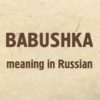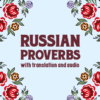Считать ворон
Hello! Here is a new episode of “Очень по-русски” podcast bringing you new very much Russian vocabulary. Today we are counting crows and telling a couple of kind ones to people with holey hands… Confusing a bit? Then let’s not delay and start the episode!
Всем пла́менный приве́т!
Heartfelt greetings to everyone!
Сего́дня мы счита́ем воро́н и говори́м па́ру ла́сковых. Присту́пим же, не откла́дывая.
Today, we are counting crows and telling a couple of kind ones. Let’s start without a delay.
Счита́ть воро́н в ру́сском языке́, как э́то ни стра́нно, мо́жно да́же в отсу́тствие сами́х воро́н. Потому́ как смысл фра́зы к воро́нам не име́ет никако́го отноше́ния, а име́ет отноше́ние к невнима́тельности и рассе́янности. По су́ти, счита́ть воро́н зна́чит глазе́ть по сторона́м. Неудиви́тельно, что ча́сто э́то выраже́ние мо́жно услы́шать от роди́телей, обраща́ющихся к со́бственным ча́дам.
“To count crows” in the Russian language, as strange as it may seem, is possible even in the absence of the crows themselves. It’s because the meaning of the phrase has nothing to do with crows but is related to inattention and distraction. In fact, “to count crows” means “to stare around”. It’s not surprising that this expression often can be heard from parents addressing their own offsprings.
Что воро́н счита́ешь? Де́лом займи́сь!
Why are you counting crows? Get busy!
Верну́в таки́м вот бесцеремо́нным о́бразом ребёнка с облако́в на зе́млю, не́которые добавля́ют па́ру ла́сковых:
Bringing in such an unceremonious way a kid from clouds to earth, some add “a couple of kind ones”:
Ру́ки твои́ дыря́вые! Ты и па́ру ме́тров не мо́жешь ничего́ пронести́ не урони́в!
Your hands are full of holes! You can’t carry anything even a couple of meters without dropping it!
Выраже́ние дыря́вые ру́ки характеризу́ет челове́ка, кото́рый всё роня́ет. Хотя́ на пра́ктике, для получе́ния зва́ния дыря́вые ру́ки доста́точно урони́ть что-ли́бо всего́ оди́н раз. 🙂
The expression “holey hands” describes a person who drops everything. Although in practice, to gain the title of “holey hands” it’s enough to drop something only once. 🙂
Па́ру ла́сковых (т.е. па́ру ла́сковых слов) в буква́льном смы́сле ла́сковыми назва́ть тру́дно, так как э́то выраже́ние есть сино́ним вы́говора, нагоня́я, не́скольких совсе́м не ла́сковых слов. Сказа́ть па́ру ла́сковых зна́чить отруга́ть, сде́лать внуше́ние, проучи́ть.
“A couple of kind ones” (i.e. “a couple of kind words”) is hard to call “kind” literally, as this expression is synonymous of a reprimand, scolding, a few absolutely not kind words. “To say a couple of kind ones” means to scold, to reprimand somebody, to teach a lesson.
Она́ не ста́ла возмуща́ться вслух, но па́ру ла́сковых в а́дрес останови́вших её ГАИ́шников всё же пробормота́ла.
She avoided resenting aloud, but still murmured a couple of “kind words” to the traffic cops that stopped her.
ГАИшники – э́то сотру́дники госавтоинспеции (доро́жной поли́ции, други́ми слова́ми), сейча́с они́ называ́ются ГИБДД, хотя́ назва́ние ГАИ по ста́рой па́мяти всё ещё употребля́ется в наро́де.
“ГАИшники” are the employees of the State Traffic Inspectorate (traffic police, in other words), these days they are called “ГИБДД”, although the name “ГАИ” is still used by people for old times’ sake.
Ещё приме́р:
Another example:
Я тебе́ таки́х па́ру ла́сковых влеплю́ – наве́к запо́мнишь!
I’m going to slap you with a couple of kind ones, you’ll remember it forever!
Су́дя по глаго́лу влеплю́, здесь под па́рой ла́сковых име́ются ввиду́ не слова́, а настоя́щая оплеу́ха.
Judging by the verb “влеплю” (I’ll slap), here “a couple of kind ones” refers not to the words, but to a real slap in the face.
И на э́том всё на сего́дня. Жела́ю вам ми́ра в семье́ и до ско́рой встре́чи!
And that’s it for today. I wish you peace in the family and see you soon!
Subscribe to our basic newsletter and receive notifications about new episodes of Very Much Russian podcast.
Or subscribe to our premium newsletter to receive both the basic newsletter and all our previous podcast episodes, one by one, on a regular basis.
Today's vocabulary
- считать ворон
Russian idioms[schee-TAT' va-RON]to loaf, to day-dream - говорить / сказать пару ласковых
Russian idioms[ga-va-REET' / ska-ZAT' PA-ru LAS-ka-vyh](= сказать пару ласковых слов) to give somebody a nice talking to (telling off), to scold, to reprimand - дырявые руки
Russian idioms[dy-RYA-vy-ye RU-kee](lit.: holey hands) her/his fingers are all thumbs (about a clumsy person)












